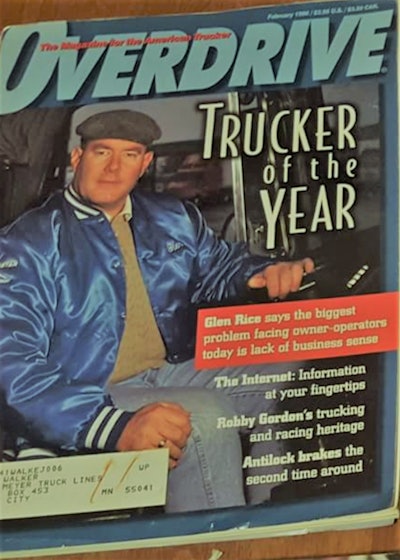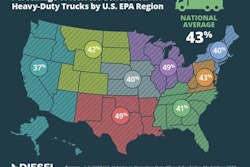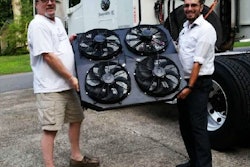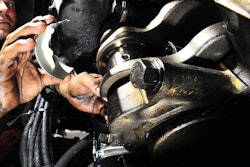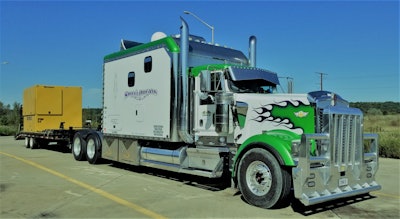 Owner-operator Glen Rice’s 2007 Kenworth W900 and its 150-inch ARI sleeper.
Owner-operator Glen Rice’s 2007 Kenworth W900 and its 150-inch ARI sleeper.Owner-operator Glen Rice is based today in New Smyrna Beach, Fla., hauling leased to R&R Express of Crayton, Pa., for more than eight years now. With his fiancee and ridealong business partner Bernice King, he rolls in the truck shown above, his 2006-emissions-spec Caterpillar C15-powered 2007 KW, which has been benefiting the last couple of years from a bypass-oil-filtration and fuel-additive system Rice purchased from the Clean Air Fleet company. The oil filter medium in the system filters out particles down to 1 micron. With it on-board, Rice has extended his typical oil-change interval from about 10,000-15,000 miles to 40,000 miles or more.
Instead of changing the oil so often, at a cost he estimates at around $275 each time, he changes his main engine oil filter and the filter media in the bypass system instead — total cost: around $90, or a $185 savings every 10,000 miles. With the bypass system costing around $1,100 installed, Rice notes, it pays for itself pretty quickly.
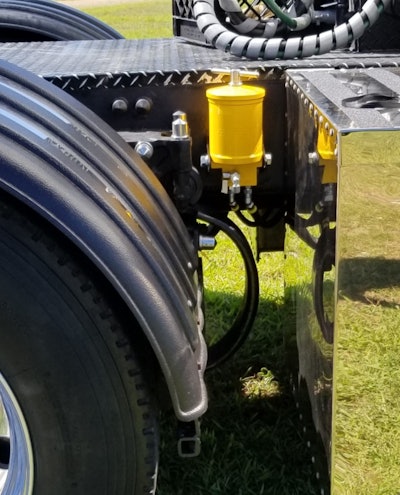 The yellow canister, shown here on the frame rail ahead of Rice’s passenger-side drive tires, houses the oil filtration media in the Clean Air Fleet system.
The yellow canister, shown here on the frame rail ahead of Rice’s passenger-side drive tires, houses the oil filtration media in the Clean Air Fleet system.The savings on oil changes are the most readily quantifiable benefits of such a system, but what brothers Kurt and Clint Braunel, founders of Clean Air Fleet, see as the system’s biggest benefit is longer-term savings on maintenance, particularly for owner-operators and fleets with later-model-emissions-spec engines.

“Basically,” Kurt says, “we got started when ultra-low-sulfur diesel came out. We recognized a huge opportunity with the fuel change and the loss of lubricity” in the fuel spec. “We also realized we could lower the emissions coming out of the tailpipe, noticeably,” simply with a fuel additive the two developed that could help deliver a cleaner burn.
Initially, Kurt adds, given the company’s Clean Air Fleet name, plenty around trucking asked if they were tree huggers or something. So many people, he says, just didn’t care much about emissions. “We started working with governments who were taking voluntary measures to help lower their emissions,” he says. “And of course we realized that maybe [some truckers] don’t care about the air quality so much, but they do care about how their truck is running.”
Clint adds that U.S. standards for fuel are lower than many nations’, citing Europe’s higher centane minimums. When you’re filling the tanks and running down the road without treating the fuel, “you’re running fuel on minimum specs,” he says. “We’re taking your run of the mill fuel that’s cheap and turning it into a premium fuel” with the additive.
As attitudes to some extent have shifted around emissions — “I know a guy who’d done deletes in the past,” Kurt says, “whose got three kids now and went with a full-emissions motor” – so too have things changed for the Braunels’ company since those early days, more than 10 years ago now. As maintenance issues compounded around emissions systems in the wake of the diesel particulate filter, first required with the 2007 diesel emissions spec, “we started to figure out there needs to be solutions to some of these problems,” Kurt adds. They say their additive, delivering a cleaner burn, combined with bypass oil filtration of particles down to 1 micron and advanced fuel filtration as well, provides a long-term benefit for today’s diesels, reducing maintenance costs.
The brothers grew up in Wisconsin on a ginseng farm, a specialized sort of operation where “if you needed a tool, often enough you had to fabricate and design/build it yourself,” Kurt says. They’ve put together a relatively easy to install dosing system for their fuel additive that has both manual and automated options — $1,000 installed for the automated system, right around $450 for the tank with the manual system that requires the operator to treat the fuel — the additive costs around 8 cents per treated gallon, give or take depending on how much you’re buying.
Owner-operator Rice says he buys it in bulk in concert with an owner-operator friend, who split the cost and the additive. He typically treats his fuel when he has reason to suspect it’s got a biodiesel component to it. “I’ve had bad experiences with it in the past, clogging up fuel filters. Since we’ve gone with the additive, I’ve had 19,000-plus miles on my fuel filters,” he says. Previously, 5,000-7,000 was a typical necessary change interval, even with premium-quality fuel filters.
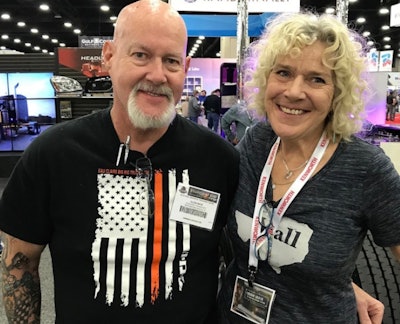 Owner-operator Rice (left) and Bernice King
Owner-operator Rice (left) and Bernice KingRice has also installed — at a cost of around $900 — Clean Air Fleet’s APU-specific bypass-oil-filtration system for his diesel-powered Perkins generator, with an eye toward extending its life. “My mechanic says that if you get 40,000 hours out of it, that’s amazing,” he says. “I’ve got 39,000 hours on it now.” As with the main engine bypass system, he’s using the APU bypass to extend his oil change interval from just about every 250 hours to 1,000 hours.
The only part of the Clean Air Fleet system Rice says he doesn’t have is its advanced fuel filtration system, which the Braunels note acts to prevent further contaminants from ever being burned and making their way through the emissions system, gumming up the works so to speak.
You can find further information about the company via this link to its website.
A little blast from the past (Glen Rice on the cover of Overdrive in the 1990s — stay tuned for more!):
